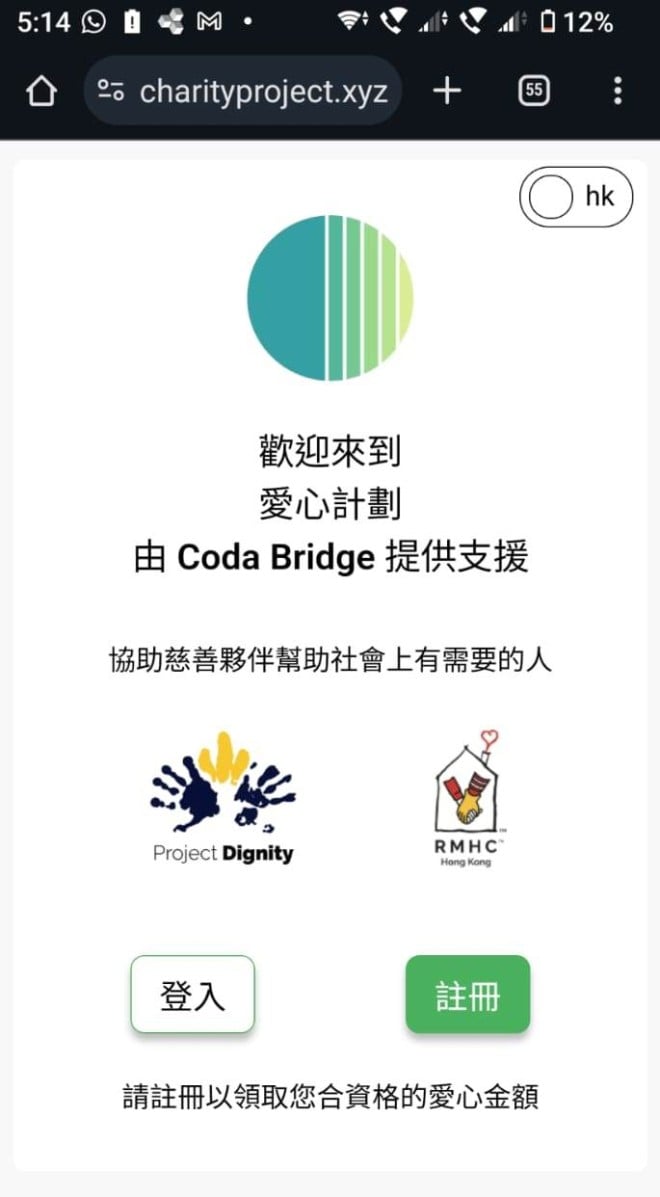Fintech
Joining hearts: How blockchain improves transparency in philanthropic giving

[The content of this article has been produced by our advertising partner.]
For donors, whether they are companies giving back to society, family offices engaged in philanthropic activities or individuals making monthly contributions, it is vital that charities provide tangible evidence that donations are reaching their intended causes.
Knowing that donations are being used for their intended purpose not only builds trust, but also encourages continued and increased support.
Recognizing this need for transparency and security, Hong Kong fintech startup Coda Bridge has launched a “Purpose-Bound Money” (PBM) platform, a charitable project that uses blockchain to ensure accurate tracking of charitable donations.
The pilot project, the first of its kind in Hong Kong, is in collaboration with Ronald McDonald House Charities (RMHC) Hong Kong and Dignity Kitchen, a social enterprise that employs physically disabled and disadvantaged people.
Powered by blockchain technology, the PBM platform uses smart contracts to distribute electronic meal vouchers worth HK$500 to eligible families (quota: 200), allowing them to eat at Dignity Kitchen.
Overall, this platform ensures that donations reach their intended recipients and are spent for their designated purposes, providing unprecedented transparency and integrity in the donation process.
“This ensures that every transaction is traceable and immutable, which helps build trust between donors, charities, social enterprises and beneficiaries,” says James Loh, president and CEO of Coda Bridge, adding that families receiving the digital vouchers they can use a QR code on their mobile phone for payment, ensuring a smooth and dignified experience.
“The PBM platform ensures that every transaction is traceable and immutable, which helps build trust between donors, charities, social enterprises and beneficiaries,” says James Loh (center), president and CEO of Coda Bridge.
“We are delighted to be the first partner in this innovative initiative. This collaboration allows us to support families with sick children and help an extraordinary social enterprise. This pilot project is a testament to how technology and compassion can come together to promote a significant change,” says Grace Fung Oei, RMHC Global Board of Directors and President of RMHC Hong Kong.
 “This collaboration allows us to support families with sick children and help an amazing social enterprise. This pilot is a testament to how technology and compassion can come together to drive meaningful change,” says Grace Fung Oei (left), member of the RMHC Global Board of Directors and President of RMHC Hong Kong.
“This collaboration allows us to support families with sick children and help an amazing social enterprise. This pilot is a testament to how technology and compassion can come together to drive meaningful change,” says Grace Fung Oei (left), member of the RMHC Global Board of Directors and President of RMHC Hong Kong.
Once this pilot project runs smoothly, Coda Bridge will expand it to Singapore to support migrant workers and other disadvantaged communities. “We envision a future where blockchain technology will play a critical role in social transformation,” adds Loh.
Stevenson Chan, chief operating officer of Coda Bridge, says the PBM platform is not just about charity, but has the potential to transform various financial transactions by ensuring funds are used for their intended purposes.
The platform’s potential goes far beyond charitable donations. It can transform the management of education funds, government disbursements, social security, e-commerce and prepaid packages, Chan explains.
Loh emphasizes that security and compliance are at the heart of the platform. “Our goal is to demystify blockchain and showcase its positive potential. We are preparing for a future where digital currency can improve the scalability of our platform,” she says.
Recognizing the growing interconnectedness between traditional finance and virtual asset markets, the Hong Kong Monetary Authority (HKMA) is developing a regulatory regime for stablecoin issuers.
To aid this process, the HKMA has launched a sandbox agreement to facilitate industry feedback on the proposed regulations.
The PBM platform currently uses tokens as underlying assets. During implementation, Coda Bridge provides merchants with a portable tablet to facilitate the acceptance of tokenized vouchers.
At the end of each accounting period, for example at the end of each month, social enterprises can redeem digital vouchers collected from beneficiaries for cash through a reconciliation process with donors, explains Chan.
 Beneficiaries receiving digital vouchers can use a QR code on their mobile phone for payment, ensuring a seamless and dignified experience.
Beneficiaries receiving digital vouchers can use a QR code on their mobile phone for payment, ensuring a seamless and dignified experience.
The system is now being tested by RMHC beneficiaries who dine at Dignity Kitchen. This testing phase allows Coda Bridge to test and fine-tune the system before expanding it to other use cases.
When asked how Coda Bridge ensures the sustainability of its business as an enterprise, Chan explains that the company generates revenue by offering smart contract development services to merchants if they don’t have such expertise.
Meanwhile, for each transaction processed through the platform, Coda Bridge charges a small fee. This revenue model provides a steady income stream while maintaining convenience for users.
“We are also in discussions with universities to gather their insights, explore new use cases and develop innovative ideas,” says Chan.
 The PBM system is now being tested by RMHC beneficiaries who dine at Dignity Kitchen. This testing phase allows Coda Bridge to test and fine-tune the system before expanding it to other use cases.
The PBM system is now being tested by RMHC beneficiaries who dine at Dignity Kitchen. This testing phase allows Coda Bridge to test and fine-tune the system before expanding it to other use cases.
“This is just the beginning,” Loh says.
“As we move forward, we will continue to innovate and find new ways to leverage technology to benefit society. Our mission is to build a future where every dollar donated is used to its fullest potential, creating a lasting positive impact.”
Headquartered in Hong Kong and backed by leading venture capitalists, Coda Bridge combines the expertise of financial and IT professionals to drive efficiency in digital transactions through its blockchain-based PBM platform.
Blockchain, otherwise known as distributed ledger technology, acts as a decentralized digital ledger that records transactions securely and transparently. Using complex algorithms and cryptography, blockchain ensures that all transactions are immutable and accessible in real time to authorized parties.
Fintech
Lloyds and Nationwide invest in Scottish fintech AI Aveni

Lloyds Banking Group and Nationwide have joined an £11m Series A funding round in Scottish artificial intelligence fintech Aveni.
The investment is led by Puma Private Equity with additional participation from Par Equity.
Aveni creates AI products specifically designed to streamline workflows in the financial services industry by analyzing documents and meetings across a range of operational functions, with a focus on financial advisory services and consumer compliance.
The cash injection will help fund the development of a new product, FinLLM, a large-scale language model created specifically for the financial sector in partnership with Lloyds and Nationwide.
Joseph Twigg, CEO of Aveni, explains: “The financial services industry doesn’t need AI models that can quote Shakespeare, it needs AI models that offer transparency, trust and, most importantly, fairness. The way to achieve this is to develop small, highly tuned language models, trained on financial services data, vetted by financial services experts for specific financial services use cases.
“FinLLM’s goal is to set a new standard for the controlled, responsible and ethical adoption of generative AI, outperforming all other generic models in our selected financial services use cases.”
Robin Scher, head of fintech investment at Lloyds Banking Group, says the development programme offers a “massive opportunity” for the financial services industry by streamlining operations and improving customer experience.
“We look forward to supporting Aveni’s growth as we invest in their vision of developing FinLLM together with partners. Our collaboration aims to establish Aveni as a forerunner in AI adoption in the industry, while maintaining a focus on responsible use and customer centricity,” he said.
Fintech
Fairexpay: Risk consultancy White Matter Advisory acquires 90% stake in fintech Fairexpay

Treasury Risk Consulting Firm White Matter Alert On Monday he announced the acquisition of a 90% stake in the fintech startup Fair payment for an undisclosed amount. The acquisition will help White Matter Advisory expand its portfolio in the area of cross-border remittance and fundraising services, a statement said. White Matter Advisory, which operates under the name SaveDesk (White Matter Advisory India Pvt Ltd), is engaged in the treasury risk advisory business. It oversees funds under management (FUM) totaling $8 billion, offering advisory services to a wide range of clients.
Improve your technology skills with high-value skills courses
| IIT Delhi | Data Science and Machine Learning Certificate Program | Visit |
| Indian School of Economics | ISB Product Management | Visit |
| MIT xPRO | MIT Technology Leadership and Innovation | Visit |
White Matter Advisory, based in Bangalore, helps companies navigate the complexities of treasury and risk management.
Fairexpay, authorised by the Reserve Bank of India (RBI) under Cohort 2 of the Liberalised Remittance Scheme (LRS) Regulatory Sandbox, boasts features such as best-in-class exchange rates, 24-hour processing times and full security compliance.
“With this acquisition, White Matter Advisory will leverage Fairexpay’s advanced technology platform and regulatory approvals to enhance its services to its clients,” the release reads.
The integration of Fairexpay’s capabilities should provide White Matter Advisory with a competitive advantage in the cross-border remittance and fundraising market, he added.
The release also states that by integrating Fairexpay’s advanced technology, White Matter Advisory aims to offer seamless and convenient cross-border payment solutions, providing customers with secure options for international money transfers.
Fintech
Rakuten Delays FinTech Business Reorganization to 2025

Rakuten (Japan:4755) has released an update.
Rakuten Group, Inc. and Rakuten Bank, Ltd. announced a delay in the reorganization of Rakuten’s FinTech Business, moving the target date from October 2024 to January 2025. The delay is to allow for a more comprehensive review, taking into account regulatory, shareholder interests and the group’s optimal structure for growth. There are no anticipated changes to Rakuten Bank’s reorganization objectives, structure or listing status outside of the revised timeline.
For more insights on JP:4755 stock, check out TipRanks Stock Analysis Page.
Fintech
White Matter Advisory Acquires 90% Stake in Fintech Startup Fairexpay

You are reading Entrepreneur India, an international franchise of Entrepreneur Media.
White Matter Advisory, which operates under the name SaveDesk in India, has announced that it is acquiring a 90% stake in fintech startup Fairexpay for an undisclosed amount.
This strategic move aims to strengthen White Matter Advisory’s portfolio in cross-border remittance and fundraising services.
By integrating Fairexpay’s advanced technology, White Matter Advisory aims to offer seamless and convenient cross-border payment solutions, providing customers with secure options for international money transfers.
White Matter Advisory, known for its treasury risk advisory services, manages funds under management (FUM) totaling USD 8 billion.
Founded by Bhaskar Saravana, Saurabh Jain, Kranthi Reddy and Piuesh Daga, White Matter Advisory helps companies effectively manage the complexities of treasury and risk management.
The SaveDesk platform offering includes a SaaS-based FX market data platform with real-time feeds for over 100 currencies, bank cost optimization services, customized treasury risk management solutions, and compliance guidance for the Foreign Exchange Management Act (FEMA) and other trade regulations.
Fairexpay is a global aggregation platform offering competitive currency exchange rates from numerous exchange partners worldwide. Catering to both private and corporate customers, Fairexpay provides seamless money transfer solutions for education, travel and immigration, as well as simplifying cross-border payments via API and white-label solutions for businesses. Key features include competitive currency exchange rates, 24-hour processing times, extensive currency coverage of over 30 currencies in more than 200 countries, and secure, RBI-compliant transactions.
-

 DeFi1 year ago
DeFi1 year agoSwitchboard Revolutionizes DeFi with New Oracle Aggregator
-

 News1 year ago
News1 year agoLatest Business News Live Updates Today, July 11, 2024
-

 DeFi1 year ago
DeFi1 year agoIs Zypto Wallet a Reliable Choice for DeFi Users?
-

 DeFi1 year ago
DeFi1 year ago👀 Lido prepares its response to the recovery boom
-

 Fintech1 year ago
Fintech1 year agoFinTech LIVE New York: Mastercard and the Power of Partnership
-

 DeFi1 year ago
DeFi1 year agoEthena downplays danger of letting traders use USDe to back risky bets – DL News
-

 Fintech1 year ago
Fintech1 year ago121 Top Fintech Companies & Startups To Know In 2024
-

 ETFs1 year ago
ETFs1 year agoGold ETFs see first outing after March 2023 at ₹396 cr on profit booking
-

 Fintech1 year ago
Fintech1 year agoFintech unicorn Zeta launches credit as a UPI-linked service for banks
-

 DeFi1 year ago
DeFi1 year agoTON Network Surpasses $200M TVL, Boosted by Open League and DeFi Growth ⋆ ZyCrypto
-

 ETFs1 year ago
ETFs1 year agoLargest US Bank Invests in Spot BTC ETFs While Dimon Remains a Bitcoin Hater ⋆ ZyCrypto
-

 News1 year ago
News1 year agoSalesforce Q1 2025 Earnings Report (CRM)

















